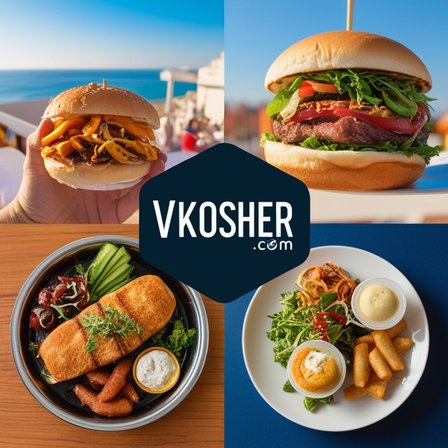Understanding Kosher Food During Shavuot
Shavuot, also known as the Feast of Weeks, is a significant Jewish holiday that celebrates the giving of the Torah at Mount Sinai. It is also a time when Jewish communities around the world come together to enjoy special meals and traditional foods that adhere to the kosher dietary laws. Understanding the significance of kosher food during Shavuot offers a deeper appreciation for the customs and traditions that have been passed down through generations.
The Meaning of Shavuot
Shavuot occurs seven weeks after Passover and is one of the three pilgrimage festivals in Judaism, along with Passover and Sukkot. Traditionally, Shavuot marks the time when the first fruits were brought to the Temple in Jerusalem. However, it is most widely recognized as the time when the Israelites received the Torah, making it a deeply spiritual occasion.
This dual significance of Shavuot is reflected in the foods eaten during the holiday. The festival is known for its dairy meals, which are a departure from the meat-based meals typically enjoyed during other Jewish holidays. The choice of dairy foods is symbolic and connected to various interpretations of Torah verses, making Shavuot unique in its culinary traditions.
The Importance of Kosher Laws
To fully appreciate the food traditions of Shavuot, it's important to understand kosher laws, which are central to Jewish dietary practices. Kosher laws dictate what is permissible to eat and how food should be prepared. These laws are derived from the Torah and have been meticulously observed by Jewish communities for millennia.
Kosher laws cover a wide range of food-related aspects, including the types of animals that can be consumed, how they should be slaughtered, and the separation of meat and dairy. During Shavuot, the focus on dairy meals means that certain kosher rules take center stage, such as the prohibition of mixing milk and meat, which influences the types of dishes that are prepared and served.
Dairy Traditions and Symbolism
Dairy foods are central to the celebration of Shavuot, and there are several reasons for this tradition. One interpretation is that dairy foods symbolize the "land flowing with milk and honey," a phrase used in the Torah to describe the Promised Land. Additionally, dairy meals are seen as a way to commemorate the purity of the Torah, with milk representing spiritual nourishment.
Another explanation is related to the Israelites' experience at Mount Sinai. When they received the Torah, they were not yet familiar with the laws of kosher slaughter. As a result, they ate dairy meals, which were easier to prepare without violating the newly given commandments. This historical context is remembered each year through the consumption of dairy foods during Shavuot.
Traditional Kosher Foods for Shavuot
A variety of dairy-based dishes are traditionally served during Shavuot, each with its own cultural and religious significance. One of the most popular dishes is blintzes, which are thin pancakes filled with sweet cheese or fruit. Blintzes are often served with sour cream or fruit compote, making them a favorite on Shavuot tables.
Cheesecake is another iconic Shavuot dish, and it is enjoyed in many Jewish households around the world. The creamy, rich texture of cheesecake, often made with kosher cream cheese, reflects the holiday's emphasis on dairy. Many families have their own cherished recipes for cheesecake, passed down through generations, each adding their unique twist to this beloved dessert.
In addition to blintzes and cheesecake, other dairy dishes commonly prepared for Shavuot include kugel (a baked pudding or casserole), quiche, and lasagna. These dishes are often made with ingredients like cheese, eggs, and vegetables, all of which adhere to kosher guidelines when prepared correctly.
Kosher Certification and Shavuot Preparations
For those observing kosher dietary laws, ensuring that all foods served during Shavuot are certified kosher is of utmost importance. Kosher certification involves rigorous inspection and supervision of food products to ensure they meet the standards set by Jewish law. This certification is especially important during holidays when traditional foods play a significant role in the celebration.
When preparing for Shavuot, many families take extra care to source ingredients that are kosher-certified. This might involve purchasing dairy products, such as milk, cheese, and yogurt, from trusted kosher suppliers. Additionally, the preparation of food in a kosher kitchen, where utensils and cookware are kept separate for meat and dairy, is crucial to maintaining the integrity of kosher laws.
The Role of Community in Shavuot Celebrations
Shavuot is not just a time for individual families to observe kosher laws; it is also a time for the community to come together. Many synagogues and Jewish community centers host Shavuot meals, where members of the community can share in the holiday's food traditions. These communal meals often feature a wide array of dairy dishes, showcasing the diversity of kosher cuisine.
In some communities, it is customary to hold a tikkun leil Shavuot, an all-night study session on the first night of Shavuot. During this time, participants study Torah and enjoy light refreshments, often including dairy snacks. The communal aspect of Shavuot highlights the collective observance of kosher laws and the shared joy of the holiday.
Modern Interpretations and Innovations
While traditional kosher foods for Shavuot remain popular, many Jewish families and chefs are also exploring modern interpretations of these dishes. Innovations in kosher cooking have led to the creation of new recipes that put a contemporary spin on classic Shavuot foods.
For example, vegan and lactose-free versions of traditional Shavuot dishes have gained popularity in recent years. These alternatives cater to those with dietary restrictions while still adhering to kosher laws. Vegan cheesecakes made with plant-based cream cheese or nut-based blintzes are just a few examples of how Shavuot foods are evolving to meet the needs of modern Jewish communities.
Additionally, the global influence on Jewish cuisine has introduced new flavors and ingredients to Shavuot meals. In some households, traditional Eastern European dishes like kugel and blintzes are complemented by Middle Eastern or Mediterranean-inspired dairy dishes. This fusion of culinary traditions enriches the Shavuot experience, allowing for a broader exploration of kosher cuisine.
Conclusion
Shavuot is a time of spiritual reflection and joyous celebration, and kosher food plays a central role in the holiday's observance. The focus on dairy foods during Shavuot is steeped in religious symbolism and tradition, offering a unique opportunity to explore the rich tapestry of kosher cuisine. Whether through traditional dishes or modern innovations, the foods of Shavuot connect Jewish communities to their heritage and to one another, ensuring that the holiday remains a vibrant and meaningful part of Jewish life.




